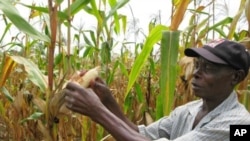Traditional crops worldwide are in urgent need of protection from global warming, according to the U.N. Food and Agriculture Organization (FAO).
The agency recently observed the 10th anniversary of its International Treaty to Protect and Share Plant Genetic Resources, a comprehensive agreement that seeks to protect farmers’ rights through sharing the benefits from the use of the genetic materials of traditional crops.
It also helps with adaptation to climate change in order to promote long-term food security.
“In Africa, we would not be just talking about the major staple crops and commercial crops we are familiar with on the international market, but we would also be talking about minor crops, which are neglected crops such as minor millets, yam, cassava, ground nuts,” said the secretary of the treaty, Shakeel Bhatti, who emphasized the important role those crops play in local food security in Africa, especially in subsistence farming.
He said traditional crops have often been neglected when it comes to agricultural and development aid, but the treaty has been working to fund support for these “under-utilized crops.”
Also among its projects are climate adaptation plans designed for agro-eco zones to help protect them from a specific type of impact from climate change.
Bhatti said the plans will develop adaptation strategies and will emphasize the most important food crops of that zone for local food security.
In addition, a benefit-sharing fund supports not only farmers’ long-term crops needs, but also their immediate and urgent needs, such as those caused by droughts, famine and malnutrition in the Horn of Africa.
“For example, in Ethiopia the benefit-sharing fund will be funding…an immediate impact project,” added Bhatti.




